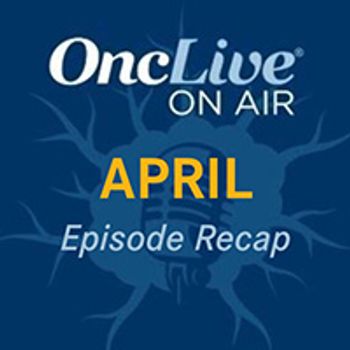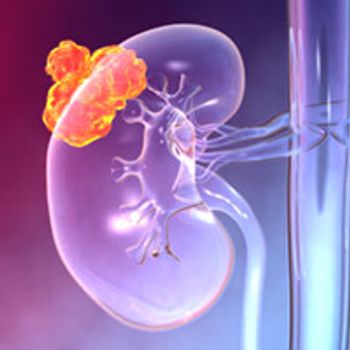
Relatlimab plus nivolumab and chemotherapy did not improve responses in untreated advanced gastric or GEJ cancer with a LAG-3 expression of at least 1%.

Your AI-Trained Oncology Knowledge Connection!


Relatlimab plus nivolumab and chemotherapy did not improve responses in untreated advanced gastric or GEJ cancer with a LAG-3 expression of at least 1%.

CAR T-cell therapy is effective and tolerable in patients with mantle cell lymphoma with secondary central nervous system involvement.

Sylvester Comprehensive Cancer Center at the University of Miami Miller School of Medicine announced the formation of the Sylvester Brain Tumor Institute.

Anne Chiang, MD, PhD, discusses understanding the heterogeneity of SCLC to determine which patients will respond to targeted therapy.

Jean L. Koff, MD, MS, discusses key considerations in the choice of BTK inhibitors for frontline and maintenance treatment in MCL.

Axel Hauschild, MD, elucidates the varying role of treatment for both cutaneous cell carcinoma and basal cell carcinoma that are seen globally.

In case you missed any, below is a recap of every episode of OncLive On Air that aired in April 2024.

Melanoma is often detected later in people with darker skin complexions and the consequences can be devastating, a Mayo Clinic study reveals.

The phase 3 KeyVibe-010 trial of adjuvant vibostolimab plus pembrolizumab in patients with resected high-risk melanoma has been discontinued.

The FDA has granted breakthrough therapy designation to petosemtamab in recurrent or metastatic head and neck squamous cell carcinoma.

Repotrectinib has been approved by China’s National Medical Products Administration for the treatment of patients with ROS1-positive NSCLC.

Jubilee Brown, MD, highlights the RAS/MAPK pathway in low-grade serous ovarian cancer and research with avutometinib/defactinib that prompted RAMP 301.

Following the consensus that the risk-benefit assessments for the proposed indications for cilta-cel and ide-cel were favorable during the March 15, 2024, FDA ODAC meeting, both BCMA-targeted CAR T-cell therapies received approvals moving them up in the treatment paradigm for relapsed or refractory multiple myeloma.

Mohamad Mohty, MD, PhD, discusses unmet needs for patients with chronic or acute GVHD, for whom standard-of-care therapies often fall short.

Salvage treatment with nivolumab plus ipilimumab following progression on nivolumab alone led to significant treatment-free survival in advanced ccRCC.

Nivolumab plus concurrent chemoradiotherapy, followed by nivolumab plus ipilimumab, did not improve PFS in unresectable stage III NSCLC.

A retrospective analysis showed that metastasectomy plus radical nephrectomy could improve survival in patients with metastatic non–clear cell RCC.

Joaquim Bellmunt, MD, PhD, discusses the impact of enfortumab vedotin plus pembrolizumab on the treatment paradigm in first-line urothelial cancer.

NICE recommends Oncotype DX to guide chemotherapy decisions in early-stage, HR-positive, HER2-negative breast cancer involving up to 3 positive nodes.

Physician-scientists at Dana-Farber Cancer Institute have received a 5-year, $15 million Program Project Grant from the NCI for research in endometrial cancer

SNB-101 has received FDA fast track designation for potential use in patients with small cell lung cancer.

First-line treatment with the combination of Versamune HPV and pembrolizumab met a best overall response end point in recurrent/metastatic HNSCC.

During an OncLive Peer Exchange, a panel of expert clinicians in CRC discussed studies seeking to further define the role of MRD testing in CRC.

Anthony M. Hunter, MD, discusses the evolution of myelofibrosis treatment beyond JAK inhibitors.

Prolonged administration of imatinib maintenance therapy for 6 years improved disease-free survival in patients with gastrointestinal stromal tumors.

Fuzuloparib with or without apatinib provided superior PFS benefit vs chemotherapy in HER2– metastatic breast cancer harboring germline BRCA1/2 mutations.

Mohamad Mohty, MD, PhD, highlights key takeaways from the 50th Annual EBMT Meeting, focusing on ongoing efforts within the GVHD treatment arena.

A Roswell Park-led team uncovers beneficial effects of combining VEGFR-targeting TKIs with checkpoint inhibitors in new research.

Adjuvant treatment with pembrolizumab plus chemotherapy did not improve DFS vs placebo plus chemotherapy in high-risk endometrial cancer.

The T-cell engager CX-904 had a favorable safety profile when administered as monotherapy in patients with advanced or metastatic solid tumors.